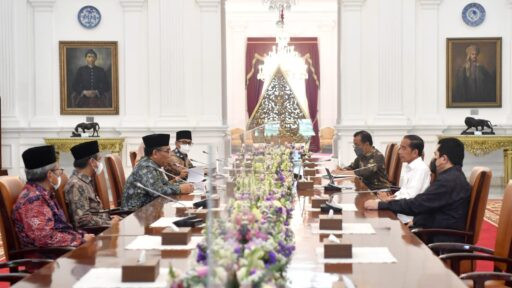Popular Reads
Top Results
Can't find what you're looking for?
View all search resultsPopular Reads
Top Results
Can't find what you're looking for?
View all search resultsGive faiths a chance at peace
It is up to the religious leaders now to convince that they are not interested in sharing power, but more in incorporating moral teachings and values that come with religions in the search for solutions to problems affecting humankind.
Change text size
Gift Premium Articles
to Anyone
 Religious affairs: President Joko “Jokowi” Widodo (second right) receives Nahdlatul Ulama chairman Yahya Cholil Staquf (third from left) and executives at Merdeka Palace in Jakarta on Sept. 22. Yahya reported preparations for the Religion of 20 (R20) forum to be held in Bali on Nov. 3-4. (Press and Media Bureau of Presidential Secretariat/Rusman)
Religious affairs: President Joko “Jokowi” Widodo (second right) receives Nahdlatul Ulama chairman Yahya Cholil Staquf (third from left) and executives at Merdeka Palace in Jakarta on Sept. 22. Yahya reported preparations for the Religion of 20 (R20) forum to be held in Bali on Nov. 3-4. (Press and Media Bureau of Presidential Secretariat/Rusman)

The theme for this week’s inaugural meeting of Religion of 20 (R20) in Bali may sound lofty, "Revealing and nurturing religion as a source of global solutions: An international movement for shared moral and spiritual values", but it is certainly worth a shot.
More than 150 leaders from many religions around the world will converge in Bali on Nov. 2-3 to discuss how faiths can be an important foundation in the search for solutions.
The R20 is part of Indonesia’s Group of 20 presidency and comes just before the group’s summit, also in Bali, scheduled for Nov. 15-16, when leaders from the world’s 20 largest economies gather to address multiple and complex global problems.
With the Russia-Ukraine war splitting the G20, it is unclear how many will come and whether they will want to sit down together. Host Indonesia has already given up on the idea of a joint statement, and is instead preparing a chairman statement from President Joko “Jokowi” Widodo.
The religious leaders attending the R20 stand a better chance of coming to a consensus, if they can put aside their doctrinal differences about truths and work together based on the universal principles and values of peace, which all faiths promote. If all the religions in the world, big and small, can unite, they can be a powerful force for peace in the world.
Another obstacle they need to overcome is how to convince skeptical governments and societies that religion has a role to play at all in the problems they face, locally and globally. That is going to take a lot of convincing in today’s highly secularized world.
The skepticism found in many societies around the world is not without reason. They have centuries of history to show how religions had been used by states to repress people. Modern history is also replete such examples. Many wars in the past have been waged in the name of religions. No wonder, the general sentiment around the world is for religion to keep out of state affairs. It may seem ironic, but secularism has the moral high ground.
It is up to the religious leaders now to convince that they are not interested in sharing power, but more in incorporating moral teachings and values that come with religions in the search for solutions to problems affecting humankind, from poverty, inequality, injustice, to tensions and conflicts. Religion can provide the moral compass, something which is sorely lacking today, in the search for these solutions.
Obviously, we can’t expect answers to all the problems in a two-day meeting, but as the Indonesian proponent of the R20 says, it strives to become a multi-faith global movement. Bali is the perfect launching pad for this movement, a predominantly Hindu island in a predominantly Muslim Indonesia. Let’s hope India and Brazil, as presidents of the G20 in 2023 and 2024, will continue the new tradition.
Bringing religion into diplomacy is certainly a challenge but the Indonesian government, c.q. the Foreign Ministry, should be commended for taking many initiatives in the past to launch dozens of interfaith dialogues at bilateral, regional and global levels. Now with the R20, Indonesia has more reason to continue and expand these dialogues.
We pray that religious leaders gathering in Bali this week will have a productive meeting and come up with a common position on their approach to global peace, which they can present to G20 leaders at their summit later in the month.
Insya Allah.










